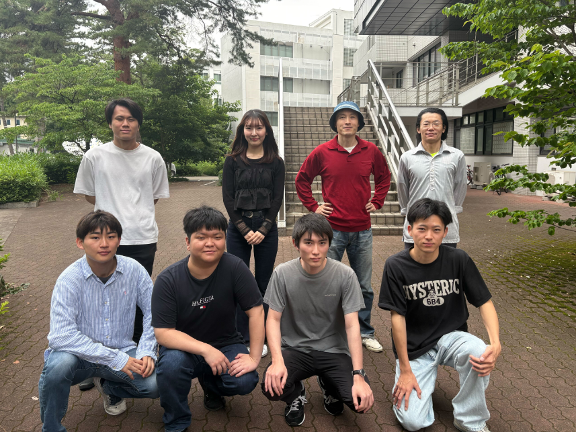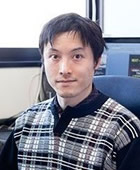Members
Lab members (all)

Principal Investigator
Masumi Taki

Professor
Hobby:Eating delicious foods
Personality:Analog
Secretary
Miwako Miyamae
Hobby:Room makerovers, dog breeding
Personality:Obliging
Senior Ph.D. Candidaes / UEC Official Guest Professors
Dr. Jay Yang
Visiting Research Professor, UEC
Professor Emeritus, School of Medicine, Univ. of Wisconsin
Visiting Professor, Department of Anesthesiology, School of Medicine, Hokkaido University
Biography:After graduating from high school in Japan, I came to the U.S. as an international student and received my B.S. (Biophysics), M.S. (Electrical Engineering), and Ph.D. (Neuroscience) degrees, and then went on to medical school, graduating with an MD degree and becoming board certified in anesthesiology. After 30 years of dual career in the U.S. as a clinician in anesthesiology and a basic research scholar, I returned to Japan after retirement in 2019. I am happy to continue my research activities at the University of Electro-Communications and Hokkaido University.
Hobbies: Research Perspective on Research: Unlike clinical practice, work in the laboratory does not immediately affect human lives. However, you should devote yourself to research with the same sense of tension and responsibility as in the clinical field.
Ph.D.Students
Riku Katsuki
D3(Professional;JSPS Research Fellow;DC1)
Hobbies: visiting sake breweries, driving, visiting hot springs, research
MBTI:INTP
Favorite drink: sake (Kuroryu, Sari Dry Gokumi)
LI CHAOHUI
D3
Hobbies:Driving a motorcycle,table tennis
MBTI:INFP
Favorite drink:Tsingtao Beer
Jeremia Frandy Apitalau
D1
Hobbies:Photograph, videography, designing
MBTI:ENFJ
Favorite drink:Coffee, Frappuccino
Master-course students
Yutaro Yanada
M1
Hobbies: games, watching movies, theater
MBTI:INFP
Favorite drink: root beer
Yuki Tominaga
M1
Hobby: table tennis
MBTI:INTP
Favorite drink: afternoon tea (unsweetened)
Haruka Uchikawa
M1
Hobbies: traveling, walking
MBTI:ISTJ
Favorite drink: beer
Yuto Tanabe
M1
Hobbies: soccer, driving
MBTI:ENFJ
Favorite drink: sangria, calpis
Bachelor Students
Toraro Fujiwara
Bachelor 4 years
Hobbies:sports spectating
MBTI:ENFP
Favorite drink:whiskey
Lab Policy
Message for students (esp. for Ph.D. candidates):
[Summary]
My laboratory has a high rate of students entering the Ph.D. program, with a success rate of 5/5 in obtaining JSPS DC grant of the Ph.D. candidates. I will do my best to support your application not only for the JSPS grant but also for other research grants and scholarships. I do not take over the research grant obtained by proposing your own idea. In other words, Ph.D. candidates who have obtained their own Grants-in-Aid are not regarded as students, but as independent researchers. I will provide an environment in which you can freely conduct research of your choice. We offer you a cozy and relaxed atmosphere for the scientific discussion, and support the freedom for the daily lab works including time managements. The following is my lab policy, and a story why I became to keep this in my mind every day for the lab managing.
[Details]
I have seen and heard of several prominent laboratories in the United States and Europe that were once (or perhaps still are) modeled after military-style laboratories, where core-work hours are set and the PI controls most aspects of the students' lives, daily research is dictated in detail by the PI, and students are put in a bad position if they do not do their research as instructed by the PI. Of course, it is obvious that research time is a major factor directly related to research results, but I did not want to stay in such a stifling environment for a long time, and I did not think I would be able to freely come up with new ideas by staying there.
As time goes by, I took some twists and turns, and became the PI. I decided that I would not restrain/manage my lab members as much as possible in their daily research lives. Before I could talk about research, I wanted to provide a humane and healthy living environment for my lab members. I try not to step in more than necessary regarding the daily research lives of lab members. I want them to feel comfortable talking bad about me (?), I also design the students' rooms to be separated from my room by a corridor. I then tell them that they are welcome to come into the professors' rooms anytime they want to discuss things with me. As a matter of course, I will give them a research theme at the beginning, explain the purpose, direction and significance of the research, and support them in their daily research, including financial support, but I have a policy of completely leaving the rest of the work to each lab member, who is responsible for it. Core hours have been completely eliminated for years, except for undergraduates who are unfamiliar with experiments and have safety issues. The rule is that the student decides what he or she will do that day and uploads it on Slack before starting the research. As long as there is no safety issue with the experiment, I do not interfere even if it is wrong. I do not go to the bench as much as possible. This is because I believe that only what one acquires through firsthand experience and practice will become one's food, reside in one's mind, and become a catalyst for one's personal growth. Please make lots of mistakes. Even if your research is not progressing well and you are not producing "accomplishment," as long as you are thinking for yourself, doing trial and error, and producing some "results," including things that don't work, that's good enough for me. Of course, in order to obtain a doctoral degree, you need to have visible "accomplishment" such as passing at least one paper in a prestigious academic journal by yourself and writing a doctoral dissertation by yourself, and roughly speaking, an "accomplishment" is proportional to 1/10 quantities of your "results". In order to produce accomplishment(s), it is important to both produce lots of results with speed and to stop and think properly based on the results and strategically link them to the results. Even then, it is only enough to produce long-term accoplishment(s) on a yearly basis. Rest when you are tired, play when you play, relax, eat well, and sleep well. If you still share the same basic research objectives and philosophy, I believe that lab members will set proper goals and devote a lot of time to research voluntarily and collectively as a result. This may seem idealistic at first glance, but we have been able to do this for the last several years, and I can only thank the lab members for creating such an atmosphere. I may be right or wrong, but I have written above about the lab's policy and my thinking at this point in 2024. I plan to stop and rethink my ideas and methods from time to time, and update them as necessary.
Finally, I welcome anyone who is interested in doing research in the lab with me, but I especially welcome students from Asia; discussions in Japanese or English are mandatory.


